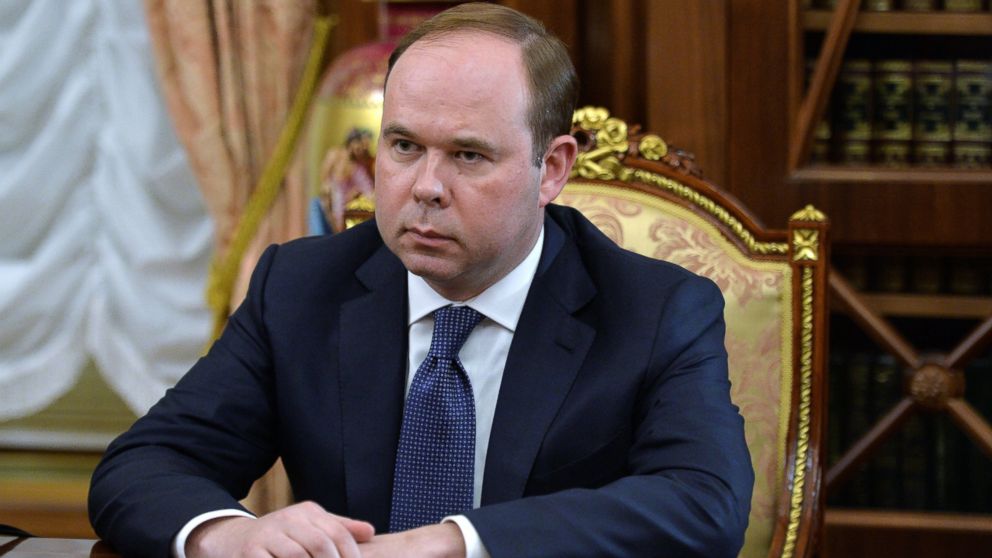Putin's New Chief of Staff Claims He Invented the 'Nooscope' to Study the Collective Consciousness
As Putin has been purging staff, his new choices are raising questions.

— -- MOSCOW-- Last week Russia’s president Vladimir Putin unexpectedly removed one of his closest associates as chief-of-staff, prompting energetic speculation of purges, palace coups and long-term changes in the Russian strongman's rule. Now the man who was appointed as the replacement to the post has also been raising questions.
Questions like: What is the Nooscope?
Anton Vaino, a former diplomat and deputy chief of staff, was elevated by Putin after he abruptly removed Sergei Ivanov, one of the closest members of his inner circle, who had known the Russian leader since they trained in the K.G.B. together. Though relatively senior already, Vaino was mostly little-known and initially most reports focused on him as a self-effacing technocrat.
But since then Vaino has become the subject of more interest (and mockery) on the Russian internet for his apparent authorship of several very peculiar academic articles, including one describing the invention of a mysterious device called the "Nooscope."
An "A. Vaino" is listed as the co-author of an article entitled, "Capitalization of the Future," published in 2012 by a Russian academic journal, Questions of Economics & Law. The vague title sets up the strange pseudo-scientific text that follows in an almost impenetrable blend of quasi-mystical language and academic jargon, mish-mashing contemporary economic concerns with transcendental philosophy and promises to be able to read the "code of the market" and describe a new way of being, made possible by the authors' creation -- the Nooscope.
Although the paper says it has already been patented 50 times, the exact definition of the Nooscope is initially hard to say. According to the paper: "The Nooscope is a device for recording changes in the Noosphere.” Reading further, it consists of "spatial sensors" and can "make the invisible visible."
One characteristic sentence reads: "The sensory network of the Nooscope, beginning from new-generation bank cards and finishing with ‘smart dust,’ straightforwardly identifies co-Being in time and space."
Most grandly, the paper apparently written by Putin's new top aide states: "The Nooscope is the first device that allows the study of humanity’s collective consciousness."
In fact, the idea of "Noo" is not Vaino’s invention but an already established -- if little known and frequently doubted -- concept. Developed as a theory in the early 20th-Century by a Russian thinker, Vladimir Vernadsky, the "Noosphere" generally means the sphere of human thought, that is the collective consciousness of mankind. Vernadsky believed that the Noosphere would be the third stage in the Earth’s development, when humanity's collective thought would affect the earth as a whole.
Though it might sound outlandish, the Noosphere has been studied elsewhere, including apparently at one time in the United States by scientists formerly part of Princeton University’ controversial PEAR parapsychology lab -- the disputed science of manipulating physical reality just with thought -- which closed in 2007. A European Union project based around big data analysis and cited in the Vaino paper is also working to create a whole-earth simulation.
The Noosphere is not widely known and nor does that especially answer why Vaino, a former diplomat who specialized in Japan and is now one of Russia's most powerful men in government, would be involved in such an esoteric branch of science.
Some Russians observers have raised doubts whether the paper was written by Vaino, suggesting he may have plagiarized it, a practice frequent in Russian officialdom, where academic theses are often seen as a necessary pass to promotion. The head of Russia’s equivalent of the FBI, the mayor of Moscow and even Putin himself have all be found with suspiciously copied passages in academic works published under their names.
So far Vaino’s work has not been found to have been stolen. The BBC’s Russian-language service spoke to one of his co-authors, Viktor Saraev, who told them the Nooscope was an "Internet of Things" device, working from Big Data.
Saraev told the BBC in an email, "Newton invented the telescope, Levenguk invented the microscope, we have invented the NOOSCOPE."



